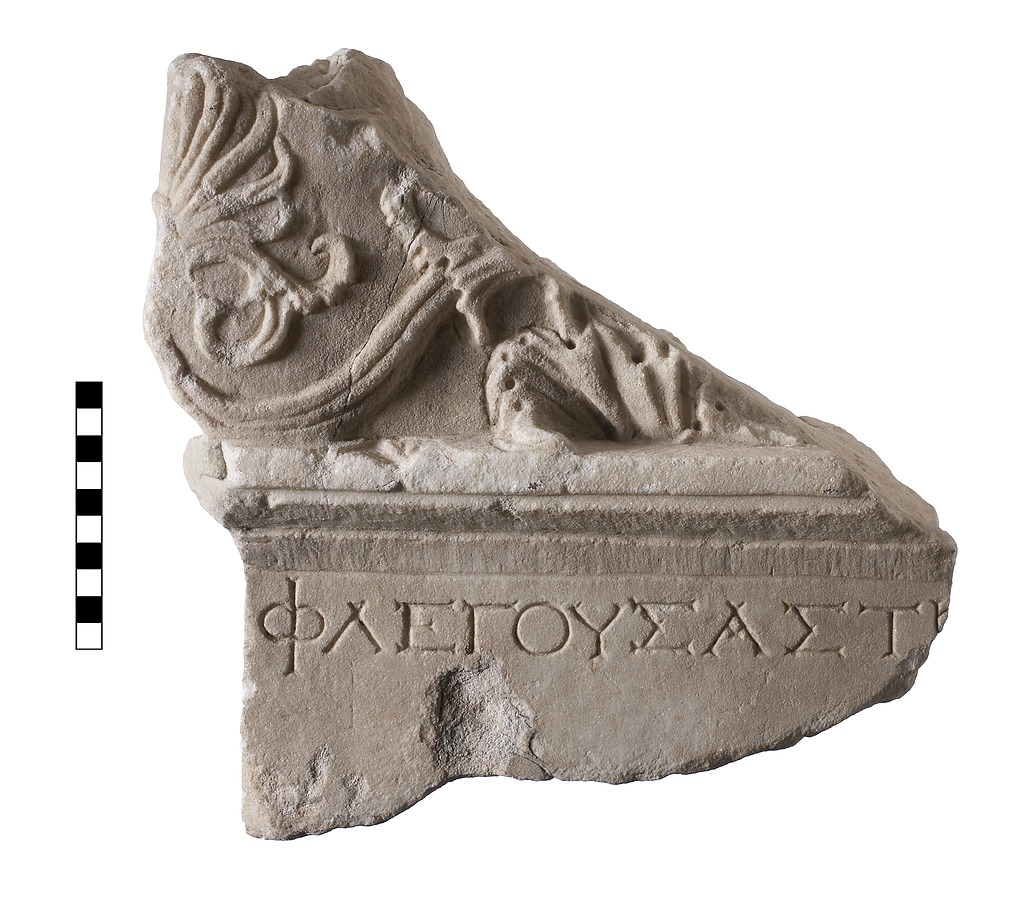8

English vs. Greek Word Order
Now that you have learned some nouns and verbs, you are ready to begin reading sentences in Greek. Note that in English sentences, the form of a word hardly ever reveals its function in a sentence. Rather, English relies upon WORD ORDER to determine the function of a given word in a sentence. As a result, The cat chases the dog expresses something rather different than The dog chases the cat.
In Greek, it is not word order, but the INFLECTION OF ENDINGS that determine a noun’s function in a sentence. In other words, if a noun is in the NOMINATIVE case because it serves as the subject of a verb, it remains the subject of the verb no matter where it is placed in the sentence. Though there are some constraints on Greek word order, for now it is good to expect the unexpected.
This lesson offers some preliminary observations and notes on translating simple Greek sentences into English. Let us use the following sentence as an example:
- ὁ Μάρκος δίδωσι τοῖς ἄρχουσι τὸν παῖδα τοῦ Πείσονος.
- Marcus gives the rulers the child of Piso.
PARSING THE VERB
A good place to start when translating a Greek sentence is the verb. In fact, a Greek verb by itself can be an entire sentence (e.g., πάρειμι. I am present). Recall that a Greek verb on its own expresses five pieces of information:
- Person
- Number
- Tense
- Mood
- Voice
To PARSE a Greek verb means to identify these five qualities about a specific verb form. The verb in our sentence, δίδωσι, is:
- 3rd person
- Singular
- Present
- Indicative
- Active
REMEMBER: The form of the verb determines its meaning, not its place in the sentence. It can appear anywhere in the sentence with no change in meaning:
- δίδωσιν ὁ Μάρκος τοῖς ἄρχουσι τὸν παῖδα τοῦ Πείσονος.
- ὁ Μάρκος δίδωσι τοῖς ἄρχουσι τὸν παῖδα τοῦ Πείσονος.
- ὁ Μάρκος τοῖς ἄρχουσι δίδωσι τὸν παῖδα τοῦ Πείσονος.
- ὁ Μάρκος τοῖς ἄρχουσι τὸν παῖδα δίδωσι τοῦ Πείσονος.
- ὁ Μάρκος τοῖς ἄρχουσι τὸν παῖδα τοῦ Πείσονος δίδωσιν.
PARSING THE NOUNS
The case of a noun in a Greek sentence conveys its role in relation to the verb or another noun. Given the relatively free word order of a Greek sentence, it is essential to parse each Greek noun before deciding its role in a sentence. Recall the cases, and their functions.
- NOMINATIVE: Usually the subject of the verb.
- GENITIVE: Often a possessive case, and translated with of.
- DATIVE: Often the indirect object of the verb, and translated with to or for.
- ACCUSATIVE: Often the direct object of the verb.
ὁ Μάρκος is NOMINATIVE SINGULAR. It is the subject of the verb, regardless of its position in the sentence.
- ὁ Μάρκος δίδωσι τοῖς ἄρχουσι τὸν παῖδα τοῦ Πείσονος.
- δίδωσιν ὁ Μάρκος τοῖς ἄρχουσι τὸν παῖδα τοῦ Πείσονος.
- δίδωσι τοῖς ἄρχουσιν ὁ Μάρκος τὸν παῖδα τοῦ Πείσονος.
- δίδωσι τοῖς ἄρχουσι τὸν παῖδα ὁ Μάρκος τοῦ Πείσονος.
- δίδωσι τοῖς ἄρχουσι τὸν παῖδα τοῦ Πείσονος ὁ Μάρκος.
τὸν παῖδα is ACCUSATIVE SINGULAR. It is the direct object of the verb, regardless of its position in the sentence.
- τὸν παῖδα ὁ Μάρκος δίδωσι τοῖς ἄρχουσι τοῦ Πείσονος.
- ὁ Μάρκος τὸν παῖδα δίδωσι τοῖς ἄρχουσι τοῦ Πείσονος.
- ὁ Μάρκος δίδωσι τὸν παῖδα τοῖς ἄρχουσι τοῦ Πείσονος.
- ὁ Μάρκος δίδωσι τοῖς ἄρχουσι τὸν παῖδα τοῦ Πείσονος.
- ὁ Μάρκος δίδωσι τοῖς ἄρχουσι τοῦ Πείσονος τὸν παῖδα.
τοῖς ἄρχουσι is DATIVE PLURAL. It is the indirect object of the verb, regardless of its position in the sentence.
- τοῖς ἄρχουσιν ὁ Μάρκος δίδωσι τὸν παῖδα τοῦ Πείσονος.
- ὁ Μάρκος τοῖς ἄρχουσι δίδωσιν τὸν παῖδα τοῦ Πείσονος.
- ὁ Μάρκος δίδωσι τοῖς ἄρχουσι τὸν παῖδα τοῦ Πείσονος.
- ὁ Μάρκος δίδωσι τὸν παῖδα τοῖς ἄρχουσι τοῦ Πείσονος.
- ὁ Μάρκος δίδωσι τὸν παῖδα τοῦ Πείσονος τοῖς ἄρχουσιν.
τοῦ Πείσονος is GENITIVE SINGULAR. In our sentence, it is closely linked with τὸν παῖδα, the child of Piso, or Piso’s child. As might be expected, nouns in the GENITIVE case are normally (but not always!) adjacent to the noun to which it is linked.
- ὁ Μάρκος δίδωσι τοῖς ἄρχουσι τὸν παῖδα τοῦ Πείσονος.
- ὁ Μάρκος δίδωσι τοῦ Πείσονος τὸν παῖδα τοῖς ἄρχουσιν.
A noun in the GENITIVE case can also show close affiliation with a certain noun by being located between a noun and its preceding article.
- ὁ Μάρκος δίδωσι τοῖς ἄρχουσι τὸν τοῦ Πείσονος παῖδα.
ENGLISH TRANSLATION
It is essential to PARSE all verbs and nouns, and determine how they function in the sentence, BEFORE you can successfully translate a Greek sentence into English. Often there is more than one legitimate way to translate the sentence. Choose the version that sounds best to you in English, so long as you do not change what is happening in the Greek sentence.
- ὁ Μάρκος δίδωσι τοῖς ἄρχουσι τὸν παῖδα τοῦ Πείσονος.
Correct:
- Marcus gives the rulers the child of Piso.
- Marcus gives the rulers Piso’s child.
- Marcus gives Piso’s child to the rulers.
- Marcus is giving Piso’s child to the rulers.
Incorrect:
- Piso is giving child of Marcus to the rulers.
- The rulers are giving Piso’s child to Marcus.
- Marcus is giving the rulers to the child of Piso.
- Marcus gives the child of the rulers to Piso.
- (Or any English sentence that makes no sense!)
– τὸ τέλος –
